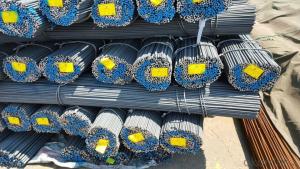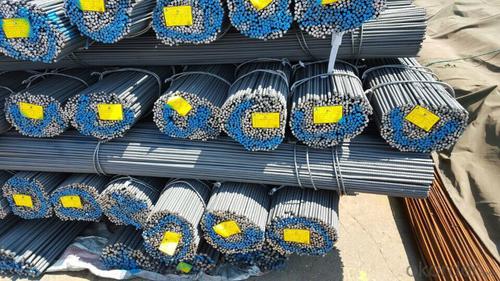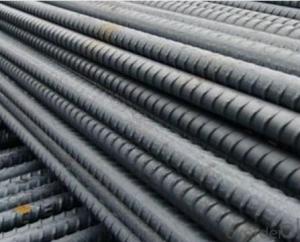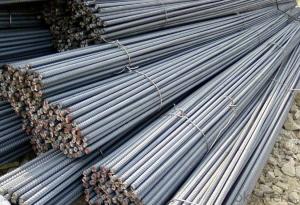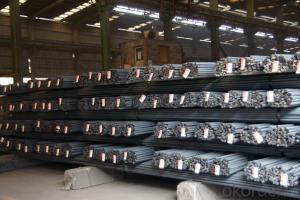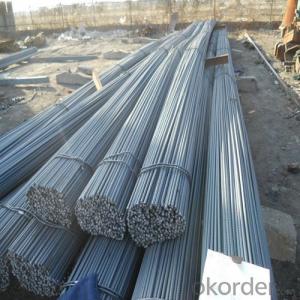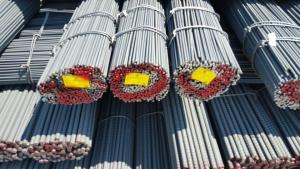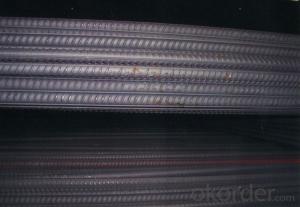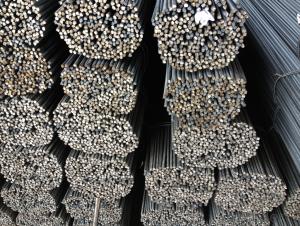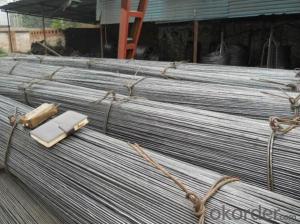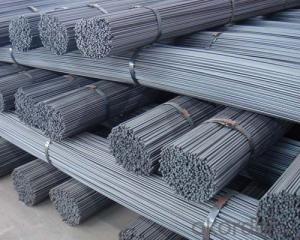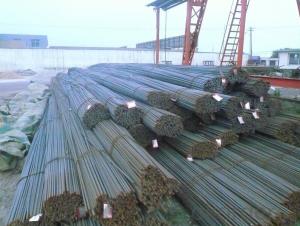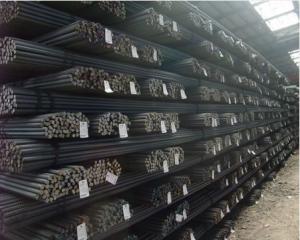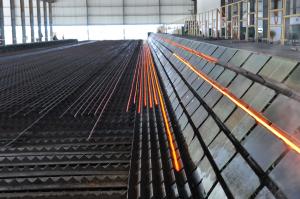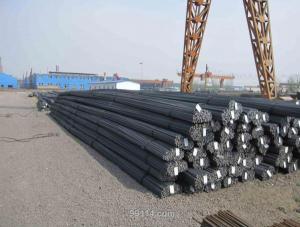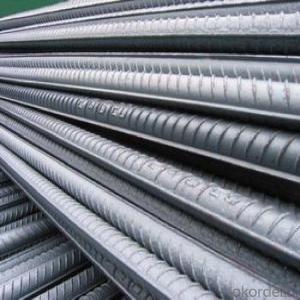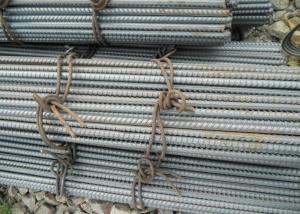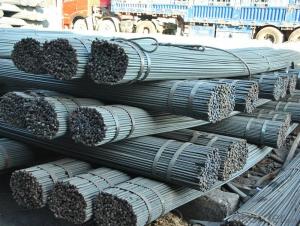Hot Rolled Reinforcing Deformed Steel Bars in Grade HRB400-HRB500
- Loading Port:
- Tianjin
- Payment Terms:
- TT OR LC
- Min Order Qty:
- 25 m.t.
- Supply Capability:
- 20000 m.t./month
OKorder Service Pledge
OKorder Financial Service
You Might Also Like
Specification
OKorder is offering high quality Hot Rolled Rebars at great prices with worldwide shipping. Our supplier is a world-class manufacturer of steel, with our products utilized the world over. OKorder annually supplies products to Africa, North American and Asian markets. We provide quotations within 24 hours of receiving an inquiry and guarantee competitive prices.
Product Applications:
Deformed bar is widely used in buildings, bridges, roads and other engineering construction. Big to highways, railways, bridges, culverts, tunnels, public facilities such as flood control, dam, small to housing construction, beam, column, wall and the foundation of the plate, deformed bar is an integral structure material. With the development of world economy and the vigorous development of infrastructure construction, real estate, the demand for deformed bar will be larger and larger.
Product Advantages:
OKorder's Hot Rolled Rebars are durable, strong, and resist corrosion.
Main Product Features:
· Premium quality
· Prompt delivery & seaworthy packing (30 days after receiving deposit)
· Corrosion resistance
· Can be recycled and reused
· Mill test certification
· Professional Service
· Competitive pricing
Product Specifications:
Manufacture: Hot rolled
Grade: HRB400 – HRB500
Certificates: ISO, SGS, BV, CIQ
Length: 6m – 12m, as per customer request
Packaging: Export packing, nude packing, bundled
Grade | Technical data of the original chemical composition (%) | ||||||
C | Mn | Si | S | P | V | ||
HRB400 | ≤0.25 | ≤1.60 | ≤0.80 | ≤0.045 | ≤0.045 | 0.04-0.12 | |
Physical capability | |||||||
Yield Strength (N/cm²) | Tensile Strength (N/cm²) | Elongation (%) | |||||
≥400 | ≥570 | ≥14 | |||||
Theoretical weight and section area of each diameter as below for your information:
Diameter(mm) | Section area (mm²) | Mass(kg/m) | Weight of 12m bar(kg) |
6 | 28.27 | 0.222 | 2.664 |
8 | 50.27 | 0.395 | 4.74 |
10 | 78.54 | 0.617 | 7.404 |
12 | 113.1 | 0.888 | 10.656 |
14 | 153.9 | 1.21 | 14.52 |
16 | 201.1 | 1.58 | 18.96 |
18 | 254.5 | 2.00 | 24 |
20 | 314.2 | 2.47 | 29.64 |
22 | 380.1 | 2.98 | 35.76 |
25 | 490.9 | 3.85 | 46.2 |
28 | 615.8 | 4.83 | 57.96 |
32 | 804.2 | 6.31 | 75.72 |
36 | 1018 | 7.99 | 98.88 |
40 | 1257 | 9.87 | 118.44 |
50 | 1964 | 15.42 | 185.04 |
FAQ:
Q1: Why buy Materials & Equipment from OKorder.com?
A1: All products offered by OKorder.com are carefully selected from China's most reliable manufacturing enterprises. Through its ISO certifications, OKorder.com adheres to the highest standards and a commitment to supply chain safety and customer satisfaction.
Q2: How do we guarantee the quality of our products?
A2: We have established an advanced quality management system which conducts strict quality tests at every step, from raw materials to the final product. At the same time, we provide extensive follow-up service assurances as required.
Q3: How soon can we receive the product after purchase?
A3: Within three days of placing an order, we will begin production. The specific shipping date is dependent upon international and government factors, but is typically 7 to 10 workdays.
Q4: Can you offer the third part inspection certificates ?
A4: Yes, we can apply third part inspection before shipping, such as SGS, BV, etc .
Images
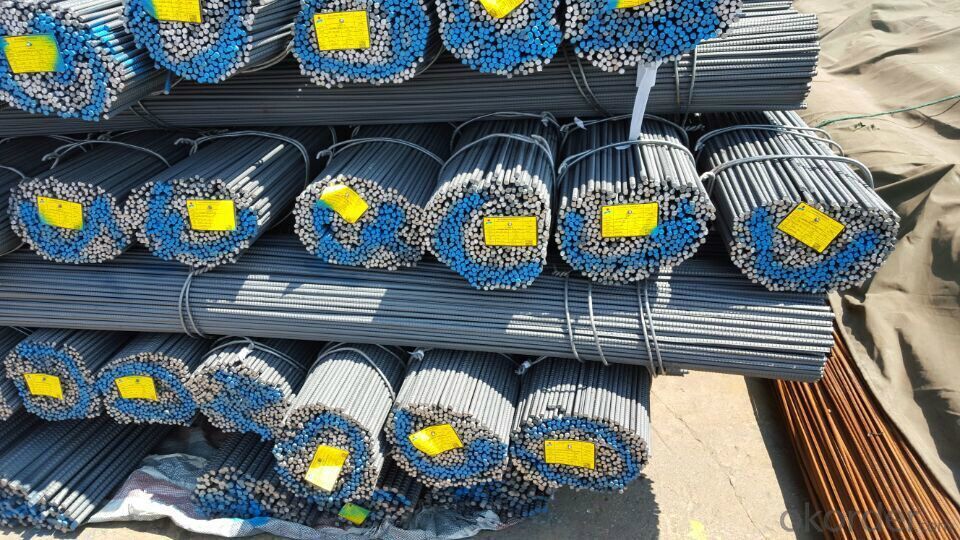
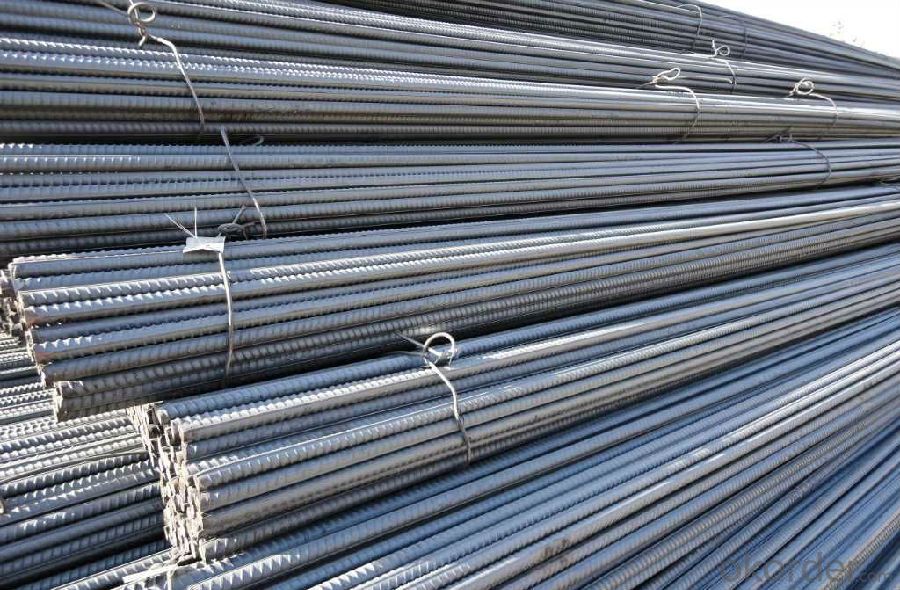
- Q: What are the guidelines for proper storage and transportation of steel rebars?
- The guidelines for proper storage and transportation of steel rebars include keeping them off the ground to avoid moisture and corrosion, storing them in a well-ventilated area, organizing them in a neat and stable manner to prevent falling or shifting, protecting them from direct exposure to weather conditions, and securing them properly during transportation to avoid damage or accidents.
- Q: What are the different types of steel rebars used in high-rise buildings?
- The different types of steel rebars commonly used in high-rise buildings include carbon steel rebars, epoxy-coated rebars, stainless steel rebars, and galvanized rebars. These rebars have varying properties and are chosen based on factors like strength, corrosion resistance, and durability to ensure structural integrity and safety in the building's construction.
- Q: What are the different types of coatings available for steel rebars to prevent corrosion?
- To prevent corrosion, different coatings are available for steel rebars. These coatings serve as a barrier between the steel rebar and its surroundings, effectively preventing or minimizing the corrosion process. The range of coatings includes: 1. Epoxy Coating: Widely used, this thermosetting polymer creates a strong and durable protective layer. It is known for its excellent resistance to chemicals and abrasion. 2. Zinc Coating: Utilized in hot-dip galvanization, zinc coatings act as sacrificial anodes, corroding in place of the steel rebar and safeguarding it from oxidation. 3. Fusion-Bonded Epoxy Coating: By melting epoxy powder onto the steel rebar's surface, a robust bond is formed. This coating is resistant to corrosion, chemicals, and moisture. 4. Polymer Coating: Coatings like polyethylene or polypropylene form a protective layer against corrosion. They exhibit high resistance to chemicals, abrasion, and moisture, ensuring long-term protection. 5. Concrete Coating: When properly applied, concrete can act as a protective coating for steel rebars. The alkaline nature of concrete facilitates the formation of a protective oxide layer, preventing further corrosion. 6. Stainless Steel Coating: The application of a thin layer of stainless steel significantly enhances corrosion resistance. Stainless steel coatings offer exceptional durability and resistance in harsh environments. Selecting the appropriate coating is crucial, considering the specific application and environmental conditions, to achieve optimal protection against corrosion for steel rebars.
- Q: How do steel rebars affect the overall stability of concrete structures?
- The overall stability of concrete structures is greatly enhanced by steel rebars. When steel rebars are added to concrete, its tensile strength is significantly increased, as concrete naturally lacks this property. Although concrete is effective in resisting compressive forces, it is weak when it comes to resisting tensile forces. By incorporating steel rebars into the concrete, the structure becomes more durable and less prone to cracking and deformation. The rebars function as reinforcement by absorbing the tensile stresses caused by external loads or internal forces. When these forces are applied, the concrete transfers the tensile stress to the rebars, which allows them to bear the load. This prevents the concrete from cracking and failing under tension, as the rebars strengthen the structure and distribute the forces more evenly. Furthermore, steel rebars provide stability and maintain the structural integrity of concrete structures in the event of earthquakes or other natural disasters. The rebars assist in resisting the lateral forces generated during seismic events, thereby preventing the structure from collapsing or sustaining significant damage. This is especially crucial in tall buildings or structures subjected to heavy loads, as the presence of rebars ensures the overall stability and safety of the structure. Additionally, steel rebars contribute to the durability and longevity of concrete structures. By inhibiting cracking and reducing the risk of corrosion, the rebars safeguard the concrete from environmental factors such as moisture, chemicals, and temperature fluctuations. This preservation of the structure's integrity over time diminishes the need for frequent repairs or replacements. In conclusion, steel rebars play a vital role in enhancing the overall stability of concrete structures. They provide the necessary tensile strength that concrete lacks, enabling it to withstand external loads and internal forces without cracking or failing. The inclusion of rebars also guarantees structural integrity during seismic events and enhances the durability of the concrete. Ultimately, steel rebars are indispensable components in the construction of strong, secure, and long-lasting concrete structures.
- Q: What is the recommended lap length for steel rebars in concrete joints?
- The recommended lap length for steel rebars in concrete joints typically depends on factors such as the type of structure, loading conditions, and design codes. However, a commonly used lap length for steel rebars in concrete joints is around 40 times the diameter of the rebar.
- Q: What is the recommended spacing between steel rebars in concrete slabs?
- The recommended spacing between steel rebars in concrete slabs typically ranges from 12 to 18 inches, depending on the specific engineering and structural requirements of the project.
- Q: What is the difference between epoxy-coated and galvanized steel rebars?
- Epoxy-coated steel rebars are reinforced steel bars that have been coated with an epoxy layer for added protection against corrosion. This coating acts as a barrier to prevent moisture and chemicals from reaching the steel, thereby extending its lifespan. On the other hand, galvanized steel rebars are steel bars that have been coated with a layer of zinc to prevent corrosion. The zinc coating acts as a sacrificial layer that corrodes instead of the steel, thereby protecting it from rust. The main difference between the two is the type of coating used, with epoxy providing more resistance to chemical corrosion, while galvanized coating offers better protection against atmospheric corrosion.
- Q: What are the main uses of steel rebars?
- Steel rebars, also known as reinforcing bars, are primarily used in construction and civil engineering projects to provide strength and stability to concrete structures. The main uses of steel rebars include: 1. Reinforcing Concrete: Steel rebars are embedded within concrete structures to enhance their tensile strength. Concrete is excellent at withstanding compressive forces, but it is weak in tension. By adding rebars, the composite material formed (reinforced concrete) can resist both compressive and tensile forces, making it suitable for various applications such as building columns, beams, slabs, and foundations. 2. Structural Stability: Steel rebars play a crucial role in enhancing the structural stability of buildings and infrastructure. They help distribute the load evenly across the structure, preventing cracks, sagging, or collapse. By reinforcing concrete elements with rebars, structures can withstand heavy loads, seismic activity, and other external forces. 3. Bridges and Highways: Steel rebars are extensively used in the construction of bridges and highways. Bridges, being subjected to significant loads and harsh environmental conditions, require strong and durable reinforcement. Steel rebars ensure the longevity and structural integrity of these critical infrastructure projects. 4. Retaining Walls and Tunnels: Retaining walls are designed to hold back soil or other materials and prevent erosion. Steel rebars are commonly used to reinforce these structures, enabling them to withstand the lateral pressures exerted by the retained material. Similarly, in tunnel construction, rebars provide strength to the concrete lining, ensuring stability and preventing collapse. 5. Foundations: Steel rebars are a vital component in the construction of building foundations. They help distribute the weight of the structure evenly to the ground, preventing settlement or sinking. Moreover, rebars help anchor the foundation to the ground, providing stability against soil movement or seismic forces. 6. Pre-stressed and Post-tensioned Concrete: In pre-stressed and post-tensioned concrete construction, steel rebars are used to introduce compressive forces into the concrete members. This technique enhances the structural performance by reducing tensile stress, increasing load-bearing capacity, and minimizing cracking. 7. Masonry Reinforcement: Steel rebars are also utilized to reinforce masonry structures like walls, columns, and arches. By embedding rebars within the mortar joints or cores, the overall strength and stability of the masonry system are improved, allowing it to resist lateral loads and seismic forces. In summary, steel rebars are indispensable in modern construction, providing strength, stability, and durability to concrete structures. With their ability to resist tensile forces, they ensure the safety and longevity of buildings, bridges, highways, tunnels, and other essential infrastructure projects.
- Q: How do steel rebars prevent concrete structures from cracking under load?
- Steel rebars, also known as reinforcing bars, are crucial elements in concrete structures due to their vital role in crack prevention under heavy loads. Rebars contribute to the structural integrity and durability of concrete in several ways: 1. Reinforcement: Acting as tension members, steel rebars add strength to the concrete. Although concrete is strong in compression, it is relatively weak in tension. When a load is applied, rebars absorb the tensile forces and distribute them throughout the structure, reducing the risk of cracking. 2. Load transfer: By embedding rebars within the concrete, they facilitate the transfer of loads from one section to another. This mechanism ensures even distribution of stresses, preventing concentrated stress points that could lead to cracks. 3. Bonding: The texture and ridges on the rebar enhance its bond with the concrete. This bond is critical as it allows the effective transfer of stress between the concrete and the steel. The interlocking action between the two materials ensures their collaboration, enhancing the overall strength and load-bearing capacity of the structure. 4. Control of expansion and contraction: Concrete structures experience temperature variations that cause expansion or contraction. Steel rebars help control these movements by providing stability and limiting the extent of cracking. They absorb and accommodate the expansion and contraction, minimizing the risk of extensive cracking and maintaining the structural integrity. 5. Flexibility: Steel rebars possess a high degree of flexibility, enabling them to absorb dynamic loads and stresses. This flexibility ensures that the rebars can withstand external forces without fracturing or damaging the concrete. By absorbing and distributing these loads, rebars prevent cracks from forming and spreading throughout the structure. In conclusion, steel rebars prevent cracking in concrete structures by reinforcing the concrete, transferring loads, enhancing bonding, controlling expansion and contraction, and providing flexibility to absorb dynamic forces. Their presence significantly improves the strength, durability, and resistance to cracking of concrete structures under various loading conditions.
- Q: How do steel rebars comply with building codes and regulations?
- Steel rebars comply with building codes and regulations by meeting the specific requirements outlined for their use in construction projects. Building codes and regulations are established to ensure the safety, durability, and structural integrity of buildings. Here are a few ways steel rebars comply with these codes and regulations: 1. Material Standards: Steel rebars must meet certain material standards set by the building codes. These standards specify the type, grade, and quality of steel allowed for construction purposes. For example, the American Society for Testing and Materials (ASTM) has established standards for steel rebars, such as ASTM A615, which outlines the requirements for deformed and plain carbon-steel bars. 2. Size and Shape: Building codes specify the dimensions and shape of rebars to be used in different structural elements, such as beams, columns, and slabs. Steel rebars must comply with these size and shape requirements to ensure proper fit and structural integrity. 3. Placement and Spacing: Building codes dictate the proper placement and spacing of rebars within concrete structures. These codes specify the minimum and maximum distances between rebars, as well as the cover requirements (distance from the surface of the concrete). Compliance with these regulations helps enhance the strength and durability of the structure. 4. Welding and Connection: If welding or connecting rebars is necessary, building codes provide guidelines on the proper welding techniques and requirements. These regulations ensure that the welded or connected rebars provide the necessary strength and stability to the structure. 5. Testing and Certification: Steel rebars need to undergo various tests to ensure compliance with building codes and regulations. These tests include tensile strength, yield strength, elongation, and bending tests. Products that pass these tests are certified as compliant and can be used in construction projects. By adhering to these building codes and regulations, steel rebars contribute to the overall safety and integrity of the structures they are used in. Compliance ensures that the rebars meet the necessary standards and perform their intended function effectively.
Send your message to us
Hot Rolled Reinforcing Deformed Steel Bars in Grade HRB400-HRB500
- Loading Port:
- Tianjin
- Payment Terms:
- TT OR LC
- Min Order Qty:
- 25 m.t.
- Supply Capability:
- 20000 m.t./month
OKorder Service Pledge
OKorder Financial Service
Similar products
Hot products
Hot Searches
Related keywords
